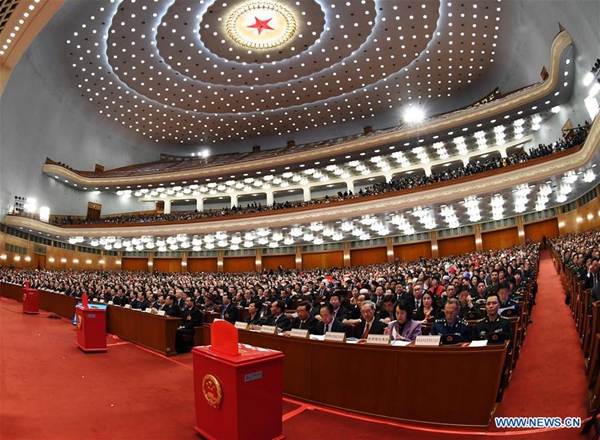Constitutional amendment adopted by NPC
 0 Comment(s)
0 Comment(s) Print
Print E-mail Xinhua, March 11, 2018
E-mail Xinhua, March 11, 2018
China's National People's Congress (NPC), the national legislature, adopted an amendment to the country's Constitution on Sunday.

Lawmakers at the ongoing NPC annual session agreed that the constitutional revision, which accords with the aspiration of the Communist Party of China (CPC) and the people and has won approval from both inside and outside the Party, is of historic significance for ensuring prosperity and lasting security of both the Party and the country.
The draft amendment was submitted to the first session of 13th NPC for deliberation on Monday.
Revising part of the Constitution is a major decision made by the CPC Central Committee from the overall and strategic height of upholding and developing socialism with Chinese characteristics in the new era, said Xi Jinping, general secretary of the CPC Central Committee, when joining NPC deputies in a panel discussion on Wednesday.
This was the first amendment to the country's fundamental law in 14 years.
The People's Republic of China enacted its first Constitution in 1954. The current Constitution was adopted in 1982 and amended in 1988, 1993, 1999 and 2004.
While the reform and opening-up drive, which began 40 years ago, has made amazing progress, it brought major changes to the country's Constitution.
From 1988 to 1999, amendments included reform of land-use rights, a legal status for the private economy, the theory of building socialism with Chinese characteristics, replacing the phrase "planned economy" with "socialist market economy," and incorporation of Deng Xiaoping Theory.
The most recent amendment in 2004 protected private property and human rights and gave the Theory of Three Represents constitutional authority.
China's Constitution has been developed along with the people's practices of building socialism with Chinese characteristics under the CPC leadership, according to Li Shuzhong, vice president of the China University of Political Science and Law.
"The amendment makes the Constitution in keeping with the times by incorporating new achievements, experiences and requirements of the Party and the country's development as socialism with Chinese characteristics has entered a new era," Li said.
A constitutional change is either proposed by the NPC Standing Committee or by more than one-fifth of all NPC deputies, and then requires the approval of two-thirds or more of NPC deputies during the annual session.





